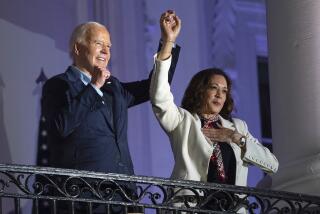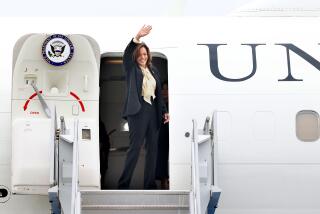Impeachment Debate Could Tar Gore and GOP
WASHINGTON — If early polls are any indication, voters in the 2000 election may take their inspiration from an old T-shirt: Kill them all and let God sort it out.
With the next election 21 months away, of course, that is a big if. But, as the Senate struggles for a way out of the impeachment quagmire, polls are detecting a brewing “pox on both your houses” sentiment that, if sustained, could threaten the Republican hold on Congress and the Democratic lease on the White House.
Every conceivable measure shows public sentiment toward the GOP Congress dwindling into the electoral arctic zone. But although President Clinton’s job approval ratings remain robust, Vice President Al Gore, who could be on the ballot in 2000, is usually trailing Republicans George W. Bush, the governor of Texas, and Elizabeth Hanford Dole, the former head of the American Red Cross, in hypothetical matchups.
“The impeachment debate,” GOP pollster Whit Ayres said, “may be an across-the-board negative for anybody associated with it.”
This intriguing alignment of attitudes toward Gore and Congress could prove utterly ephemeral--as many operatives on both sides suspect and certainly hope. “If you wrote that, you would hate yourself a year from now when I send you a copy of it,” said Democratic media consultant Robert Squier, a senior advisor to Gore.
But the early polling might suggest a predisposition in the electorate that both Gore and the GOP Congress must work to overcome.
“Both could get hurt,” presidential historian Robert Dallek said. “At this juncture, I could well imagine that in the year 2000 we see the public voting in a George W. Bush because Gore is tarred . . . and, at the same time, they vote in a Democratic House and maybe even a Democratic Senate.”
Such a result would be unusual because the party that wins the White House typically wins congressional seats as well. But that pattern has eroded recently. The party losing the White House made small House gains in 1988 and 1992 and small Senate gains in 1996 and 1984.
Gore’s situation now is strikingly similar to that faced by former President Bush when he sought to move from the vice presidency into the top job. In 1987, Bush was hazily defined and known mostly for his role supporting a generally popular president, Ronald Reagan, who nonetheless was besieged by scandal (the Iran-Contra controversy) in the waning months of his presidency.
Buffeted by an almost inchoate yearning for change, Bush consistently trailed in the polls, first to former Sen. Gary Hart (D-Colo.) and then, by even larger margins, to eventual Democratic nominee Michael S. Dukakis. Indeed, as late as the summer of 1988, Dukakis led Bush by 18 percentage points in some surveys.
All of those factors are recognizable in Gore’s case. His president is still popular: Clinton’s roughly 65% approval ratings are far higher than Reagan’s at the same point in his presidency.
But Gore has not yet built a strong public identity of his own. A notable 39% of voters said in a Times poll last week that they have an unfavorable impression of him. Additionally, many Republicans believe that, whatever voters may say now, once the impeachment crisis fades, disillusionment over Clinton’s behavior will feed a desire for change in 2000.
Some of that sentiment may be subtly apparent in the flurry of recent polls that have found Gore trailing the younger Bush, who resoundingly won a gubernatorial reelection last fall and is generally considered the Republican front-runner for 2000. Bush, who says that he will decide later this spring whether to run, led Gore by 18 percentage points in The Los Angeles Times Poll, by 11 points in a Marist Institute poll and by 2 points in a Newsweek survey.
The disparity in these results suggests the fluidity of opinions about an event so far away. But The Times Poll pinpointed a potentially worrisome dynamic for Gore. When measured against Gore, Bush won fully 42% of voters who did not want Clinton removed from office yet disapproved of his morals. That helps explain why Bush was winning two-thirds of independents and nearly one-fourth of Democrats in the poll.
“I have always thought that the [Monica S.] Lewinsky scandal would have its comeuppance for the Democrats in the presidential election,” said Republican pollster Fred Steeper. “It’s not so much anti-Gore, it’s ‘If I want to send a message about the kind of person I want in the White House, I will put in Elizabeth Dole or George W. That’s the clearest message I can send.’ ”
Yet, as the older Bush proved in 1988, such an early bent toward change isn’t necessarily fatal. Bush stormed back to win the presidency behind two central weapons: He aggressively defined Dukakis as out of the mainstream by painting him as a “Harvard Yard liberal,” and, together with Reagan, he made a strong case for continuity by underscoring the improvements in the country’s condition (particularly the economy) during Reagan’s years in office.
Both of those weapons are potentially available to Gore. In The Times Poll, Gov. Bush’s favorability rating was so high (just 8% of voters expressed an unfavorable view of him) that it suggests he may be all things to all people.
Many Democrats believe that, if he becomes the nominee, Bush will look less attractive to swing voters, particularly in coastal states, when they learn that he opposes abortion and has been skeptical of gun control. “It is very hard for a pro-life presidential candidate to win here in California, George W. Bush or no George W. Bush,” Los Angeles-based Democratic strategist Bill Carrick said.
And, like the elder Bush in 1988, if Gore is the nominee, he could have an enormous stockpile of positive trends on which to fashion a case for continuity. These include job growth, a surging stock market, falling crime, welfare reform and the federal budget surplus. In most surveys, the level of public satisfaction with the country’s direction, in fact, is much higher than it was in 1988.
Assuming it lasts, that high level of contentment also could help Republicans in Congress recover from the public backlash against impeachment. But they have placed themselves in an extraordinarily exposed position, with negative poll numbers accumulating in every direction as the impeachment struggle slogs on.
For congressional Republicans, the problem is not just that the effort to impeach Clinton is unpopular. It also is that impeachment appears to have eclipsed all other messages about their party. In a CBS/New York Times poll released Tuesday, Democrats held wide advantages over Republicans when voters were asked which party could better handle the nation’s problems. Democrats held huge leads on issues such as Social Security and education and ran slightly ahead even on traditionally Republican priorities like cutting taxes and fighting crime.
Faced with this divide between early attitudes about the next contests for Congress and the White House, both parties may find the interests of their congressional and presidential wings diverging.
The parties are likely to be conflicted as well about discussing the scandal. Some GOP strategists already have signaled that they hope the impeachment fight disappears from view as soon as the last Senate vote is cast. But several Republican presidential candidates, including former Vice President Dan Quayle and 1996 contender Lamar Alexander, have indicated that they intend to attack Gore over his defense of Clinton.
That strategy might produce some difficult moments for Gore. But it could also keep the impeachment controversy in the public eye next year--deepening the threat to congressional Republicans.
More to Read
Get the L.A. Times Politics newsletter
Deeply reported insights into legislation, politics and policy from Sacramento, Washington and beyond. In your inbox three times per week.
You may occasionally receive promotional content from the Los Angeles Times.










